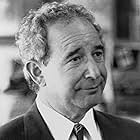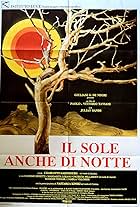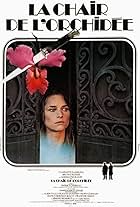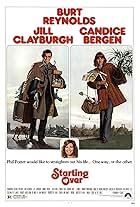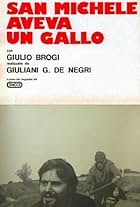A Manhattan woman struggles with her identity as she tries to move on from a painful divorce.A Manhattan woman struggles with her identity as she tries to move on from a painful divorce.A Manhattan woman struggles with her identity as she tries to move on from a painful divorce.
- Nominated for 3 Oscars
- 6 wins & 18 nominations total
- Sue
- (as Pat Quinn)
- Cabbie
- (as Chico Martinez)
- Director
- Writer
- All cast & crew
- Production, box office & more at IMDbPro
Storyline
Did you know
- TriviaDr. Penelope Russianoff, who plays Erica (Jill Clayburgh)'s therapist Tanya, was an actual practicing psychologist. The counseling sessions were filmed in her actual penthouse apartment on West 86th Street in New York, where she saw her patients. She worked for two and a half days and was paid US $2500. She was cast after having been recommended to director Paul Mazursky by "Girlfriends" (1978) director Claudia Weill. Russianoff said that she improvised most of her dialogue, which was based on the type of therapy she gave her patients. After the movie was launched, Russianoff became a mini-celebrity. She said the role gave her "instant celebrity-hood," being recognized on the streets of New York, where she signed autographs, and got a number of new clients. She wrote several self-help books in the 1980s, including "Why Do I Think I Am Nothing Without a Man?" (1988), a book first published about a decade after this film, but with a title and subject matter that were reflective of this picture.
- GoofsThe boom is clearly visible for several seconds during the art gallery scene.
- Quotes
[first lines]
[Martin and Erica are jogging along the river]
Martin: Jesus Christ! Look at this! My sneaker's ruined!
Erica: They're only $35.
[Erica takes Martin's shoe and cleans it off for him]
Martin: Fucking city's turning into one big pile of DOG SHIT!
[shouting at passing traffic]
Martin: Come on out and take a crap on me--everybody else is. Fuck!
[Martin lights a cigarette]
Erica: ...been jogging for 2 1/2 miles - you're giving yourself lung cancer.
Martin: I'll tell you something, Erica: the longer I'm married to you, the more you sound like my mother.
Erica: Clean your own sneaker.
[throws shoe at Martin]
Martin: I think you wanted me to step in it.
Erica: [laughing] You're going crazy, Martin.
Martin: I am?
Erica: [laughing] Yes.
[Martin tosses his shoe over his shoulder into the river. Erica jogs away, and Martin jogs after]
- Crazy creditsFor Betsy
- SoundtracksSwan Lake, Op.20
(1877) (uncredited)
Written by Pyotr Ilyich Tchaikovsky
Excerpts danced by Jill Clayburgh
WOMAN deals with Erica (Jill Clayburgh), a middle aged, middle class Manhattan housewife who suddenly discovers that her husband has fallen in love with a younger woman and wants a divorce. She responds with predictable anger and outrage, before settling down to the business of "surviving." Divorce is never easy, but as divorcees go, Erica has it awfully good. She is blessed with, in no particular order, a guilt-ridden ex-husband who churns out the checks; a supportive teenaged daughter, who apparently has little interest in her dad; an ad hoc support group made up of girlfriends who cheerfully share in male-bashing self-righteousness; and an indulgent female therapist adept at nodding her head in mechanical approval and dispensing dime-store encouragement. And when it comes time to get back into action, she has no trouble findings a couple of hunky guys, who, by the way, are artists, not boring old businessmen like her ex-hubby, Martin. In short, female bonding goes on all over the place and men are put in their place as convenient sex objects.
Indeed, divorce seems to be a blessing in disguise. Compared to the heroines of films like ALICE DOESN'T LIVE HERE ANYMORE or NORMA RAE, Erica seems to have it pretty darn good. And that is a major problem in the film: it is noticeably lacking drama. Had the film been played more for humor, then Erica's newfound awaking might have had a joyous kick. Instead, Mazursky labors to make serious, i.e., feminist statements about the travails of being a woman in contemporary America. But, boy did he pick the wrong woman to use as a poster child. Since Erica really doesn't have any discernible hardships in her life, the film falls back on the last refuge of feminist self-pity: self-esteem. AN UNMARRIED WOMAN is about Erica learning to feel good about herself. ZZZZZzzzzzzzz.....!
Maybe because I am a male, I found Erica's journey to self-awareness boring. Jill Clayburgh, who plays Erica, was the actress du jour of the era. She had the curious ability to seem sad even when she was happy and vulnerable even as she was being hard-bitten. Unfortunately, this is the way she came off whether the role required it or not. It is what the role of Erica required, but even so I have never found Clayburgh to be a particularly likable actress; she behaves like she is in the movies because she doesn't have a choice. She is not a giving actress. Erica seem perpetually annoyed that she even has to "survive" and Clayburgh acts as though she has something else she'd rather be doing.
Again, perhaps because I am a man, I found the relatively minor character of Erica's husband to be more compelling and more complex. Played by Michael Murphy like an extension of his role in Woody Allen's MANHATTAN, Martin is a cliche -- a middle-aged man walking away from a comfortable marriage in search of something to revitalize his life -- but as cliches go, it is a valid one. Murphy gives a glimpse of a man in emotional and philosophical turmoil; it is a performance that vividly reveals more in a few short scenes than Clayburgh does with all of Erica's tiresome whining. We see why he wanted out of his marriage to Erica, but not why he'd want back in.
Mazursky is not a great director or a particularly skillful writer, but he is even worse as an editor. He has no sense of pace and loves to let scenes ramble far beyond their point of impact. But in his best films, such as BOB & CAROL & TED & ALICE, MOSCOW ON THE HUDSON and DOWN AND OUT IN BEVERLY HILLS he gently mocks self-absorbed, trendy twits. Here, instead of teasing the foibles of his New Yorker of choice, he embraces her. He wants us to know he understands feminine/feminist angst. In a strange way, AN UNMARRIED WOMAN is less about a woman or even women, than about a man trying to prove his liberal credentials by pandering to feminist stereotypes. As such, a film that strives to be realistic ends up being condescendingly phony.
- How long is An Unmarried Woman?Powered by Alexa
Details
Box office
- Gross US & Canada
- $24,000,000
Contribute to this page























